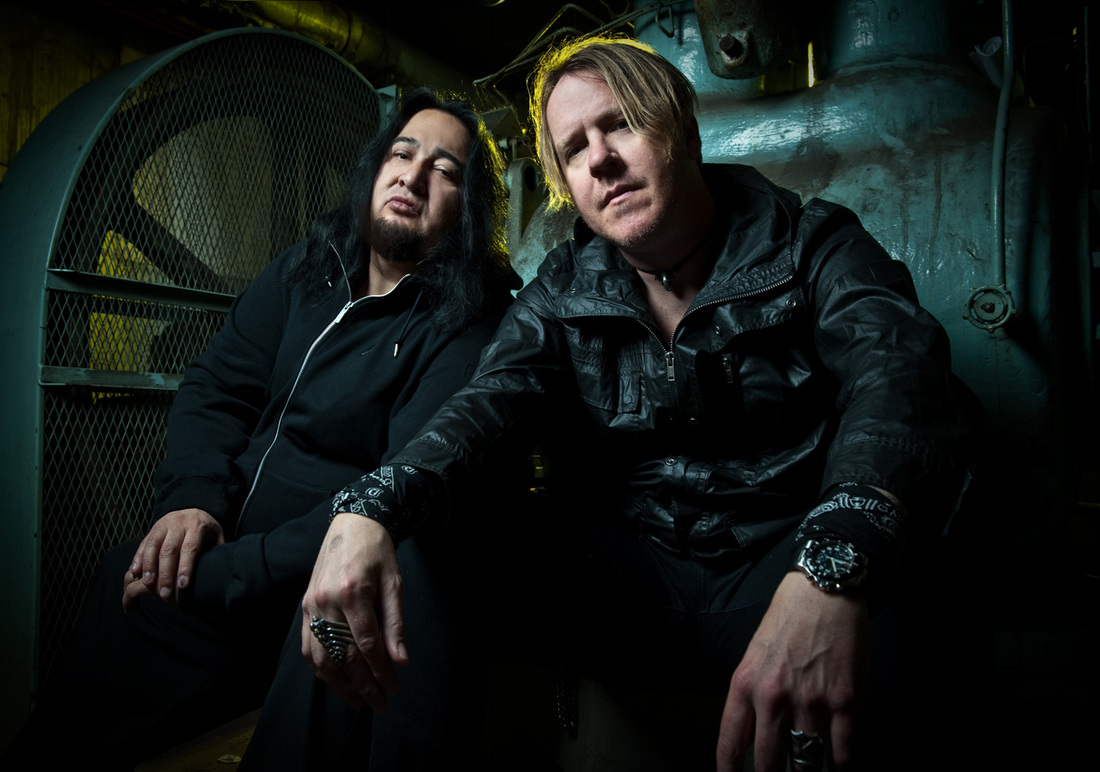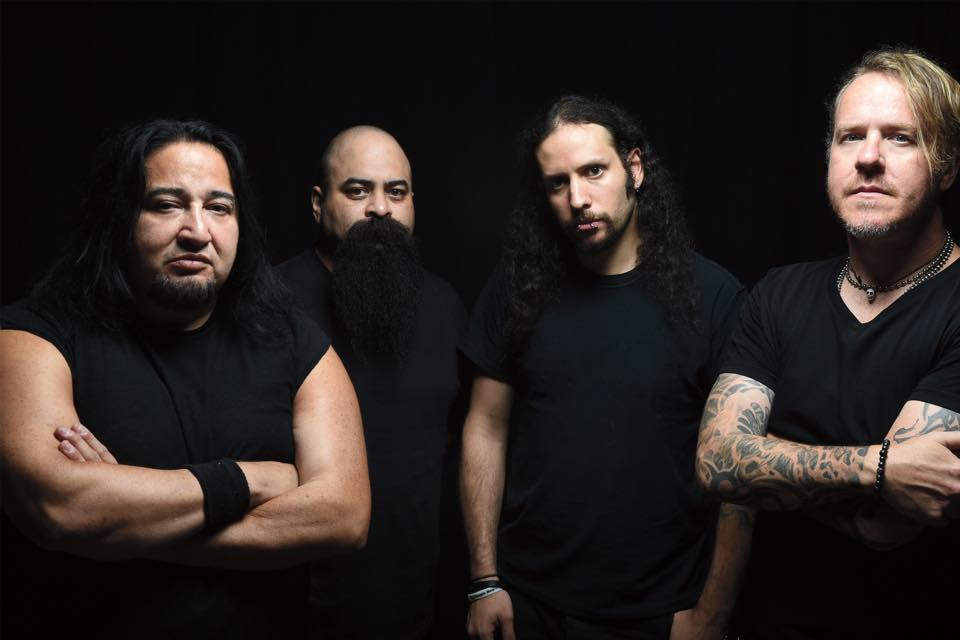|
Linchpins of industrial metal, Fear Factory have released some of the most important albums in the genre. From ‘Soul Of A New Machine’ in 1992 to 1995’s defining ‘Demanufacture’, and 2015’s career-affirming ‘Genexus’, the band has always been leaders in their field. Weathering changing trends and acrimonious line-up shifts have all however, also played part of the Fear Factory story. We caught up with founding guitarist Dino Cazares at Bloodstock Festival, to chat about the band’s history, and its future. Obsolete, erased, extinct: Eamon O’Neill.
Hi Dino, how are you today?
I’m great. The band is completely honoured to be here to be paying Bloodstock. This is our second time, and [festival directors] Alan [Gregory] and Vicky [Hungerford] have specifically requested that we play ‘Demanufacture’ in its entirety today, so that’s what we’ll be doing. The last time I caught Fear Factory live was back in 1998. A lot has happened to the band since then, hasn’t it? Definitely a lot has happened to the band; good and bad things, of course. I was out of the band for a few years. I came back in 2009, and we’ve put out three albums since then. It must have been difficult to have been on the outside of that bubble for a while. I mean, it took me a minute to recover from that; a good three or four months, but then I was like; “screw this, just get back on the horse and do your other projects”, and that’s exactly what I did. I released two albums with my other band called Divine Heresy, which a lot or people know about. I also did some underground Mexican music in Spanish - a band called Brujeria - and another band called Asesino. I also did Roadrunner United, so I was actually, kind of grateful of the freedom of being out of Fear Factory, because it allowed me to explore other avenues and actually make time for other projects that I wanted to do. Fear Factory had been on a steady rise up until you left the band after ‘Digimortal’ in 2002. ‘Obsolete’ was the one that really opened the doors for us. On ‘Demanufacture’, ‘Obsolete’ and ‘Digimortal’ we got gold records. But you know, when I left the band, I noticed that they were starting to decline. They put a record out ‘Archetype’ which was pretty good; it kind of maintained it, but then they came out with another record called ‘Transgression’ that just completely flopped, and then the band kind of had their own meltdown. I wasn’t in the band back then; that was their own little meltdown, and I think it just kind of went down from there, and so ever since then, Me and Burt [singer and co-founder Burton C. Bell] have been trying to bring it back and retain the classic Feat Factory, and I think we’ve done a good job of that. Your latest album ‘Genexus’ was particularly well received.
When we came back with a record called ‘Mechanize’, we we’re like; “okay”; that was the first record when I came back, and my attitude was; we’ve got to come out swinging, we’ve got to come out heavy, you’ve got to come out hard, and you’ve got to give some extreme Feat Factory. And that’s pretty much what we did with songs like ‘Fear Campaign’, ‘Powershifter’, and ‘Christploitation’, and we wanted to make a heavy album, and I think we were good at that. Just picking up on something you mentioned earlier; and you actually listened to those Fear Factory albums that came out when you weren’t in the band? Of course, I mean, how could I not listen to them? Normally in a headlining set, we actually add a song or two from those records. I mean I have to; the fans want it, you’ve got to do it. You’ve spent the last couple of years playing ‘Demanufacture’ anniversary shows. Going back to ‘Obsolete’, and would you be tempted into doing anniversary shows for that album? For sure, one hundred percent, it will happen. I can’t tell you when, but once we’re done with this touring for ‘Genexus’, we’re going to be doing another record already, because ‘Genexus’ is actually already one year old. You’ve played a lot of festivals over the years, and there’s an infamous clip of you playing… Donington? Where I took my shirt off? Yeah, I just did that actually last night in Brighton. It was hot as f**k, it was on the beach at a place called The Concorde, and I was saying; “come on all you fat c***s, let’s see those f***in’ bellies out!”, and all the dudes were taking off their shirts, and I took mine off, and the whole crowd was just f****n’ cheering! Back in the late 1990s, Fear Factory were one of the few metal bands who were keeping the genre alive.
I don’t think metal ever really dies. It might go through a plateau; highs and lows, but we’re still doing our thing, and a lot of the other bands are still doing their thing, and if bands like Judas Priest and those guys in their late sixties can still do it, we can all still do it when we get to that age. Coming back to Fear Factory, did it feel like coming home for you? 100% it felt like coming home. Just re-joining again with Burton again was just a really good feeling, because you know, we were the ones who pretty much came up with the concepts, came up with the sounds; what we were going to sing about, what the band was going to sound like, so it’s all really good to come back with my old partner and still have the connection of what of first started back in Hollywood; when we were eating dog food, trying to survive in Hollywood in California, and trying to create these records. And we liked such diverse stuff, which really helped us make Fear Factory. There have been a lot of changes since then, but the band seems to have a stable line-up once again. We have a solid line-up right now, that’s been together for the past four years. We have a drummer named Mike Heller, and we found him on YouTube. I don’t know if you’ve ever heard of a thing called sickdrummer.com, but Sick Drummer is an organisation that sponsors drummers, and if you ever need a drummer, just ask them. Clearly Fear Factory needs a sick drummer. We had a lot of different drummers that I had to choose from, and this one guy just happened to be out of New York, was in underground, extreme, technical death metal bands, and we needed somebody who was really good with his feet. The band did do one album – 2012’s ‘The Industrialist’ that did feature a drum machine before that. We did an album with a drum machine because at the time after ‘Mechanize’, there was a time when negotiations with Gene Hoglan obviously got the best of him, because he negotiated his way out, basically. So we were kind of left without a drummer, so we were pressed for time, the label wants to put a record out, so we did it with a drum programme - a drum machine, and there’s thousands and thousands of bands that have done it; Judas Priest has done it in the eighties, and a lot of people have done it. Unfortunately, even though we’re a band that’s cutting edge technology; we’ve talked about it for years [using a drum machine], and it became an issue with us [for the fans]. Finally, what’s happening with Fear Factory going forward? As of right now, we’re doing this European festival touring run, and then after that we go back and we do another U.S. tour. Then at the end of the year we’ll start writing the new record so we’ll have something new out by next year, and then we’ll be touring for that record, and then it will be coming up on the twenty year anniversary of ‘Obsolete’. 2018 is the anniversary, but we might start a little earlier [with the ‘Obsolete’ shows] than that, we’ll see. That was like our biggest record by far, and I think it’s going to draw a lot of people. Like this interview? Like us on FaceBook and follow us on Twitter for regular updates & more of the same. |
|
Fear Factory.
"I was actually kind of grateful of the freedom of being out of Fear Factory, because it allowed me to explore other avenues and actually make time for other projects that I wanted to do." - Dino Cazares.
© 2016 - 2024 eonmusic.co.ukContact: [email protected]
|


